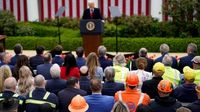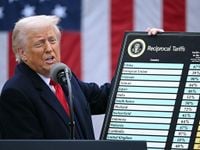US President Donald Trump has intensified a global trade war, announcing sweeping tariffs that could reshape international trade relations and impact the global economy. On April 2, 2025, Trump declared a minimum 10% tariff on nearly all imports into the United States, with significantly higher rates imposed on specific countries, particularly those he deems as "worst offenders." This move has raised concerns about inflation, economic growth, and the ongoing efforts to combat climate change.
During a press conference in the Rose Garden at the White House, Trump characterized the tariffs as a necessary response to what he called decades of the US being "looted, pillaged, raped and plundered" by other nations. He stated, "For decades, our country has been looted, pillaged, raped and plundered by nations near and far, both friend and foe alike." The tariffs, which will take effect on April 9, 2025, include a 34% duty on imports from China, raising the overall tariff on Chinese goods to a staggering 54% when combined with an earlier 20% tariff. The European Union will face a 20% tariff, while countries like Japan will see tariffs of 24%.
In total, the White House has identified 57 countries, territories, and economic blocs that will be subject to these increased tariffs. Countries such as Cambodia and Myanmar will face even steeper tariffs of 49% and 44%, respectively. Notably, the United Kingdom and Australia will also see the minimum 10% tariff applied, despite their status as allies.
The implications of these tariffs extend beyond mere trade numbers. Economists have expressed concerns that while the tariffs may reduce the US trade deficit with individual countries, they will not address the overall trade deficit the US has with the rest of the world. In 2023, the US reported a trade deficit of $1.1 trillion, the largest of any nation. Professor Jonathan Portes from King’s College London noted, "Yes, it will reduce bilateral trade deficits between the US and these countries. But there will obviously be lots of broader impacts that are not captured in the calculation."
In addition to the tariffs on specific countries, Trump has invoked the International Emergency Economic Powers Act of 1977 to impose a flat 10% tariff on products from almost all other trading partners, set to take effect on April 5, 2025. This sweeping approach has alarmed many global leaders. Australian Prime Minister Anthony Albanese remarked that the tariffs were "not the act of a friend" and could harm the close ally relationship.
The tariffs have also sparked fears of retaliatory measures from affected countries. China has already responded by halting imports of liquefied natural gas (LNG) from the US for 40 days, a move attributed to the heightened trade tensions. The Chinese government warned that these tariffs could "endanger" global economic development, emphasizing the interconnectedness of modern economies.
While some may argue that a reduction in trade could lead to lower greenhouse gas emissions in the short term—similar to the drop seen during the COVID-19 pandemic—experts caution that the long-term effects of Trump's trade war could be detrimental to global efforts to combat climate change. The tariffs are likely to lead to more energy-intensive goods produced domestically in the US, dampening international investment in renewable energy projects.
As businesses and governments around the world brace for the economic fallout, there is concern that the focus will shift away from long-term investments in clean technologies toward more immediate financial concerns. The International Energy Agency has noted that small to medium-sized enterprises have become more hesitant to invest in renewable energy applications due to economic uncertainty.
Trump's administration has justified these tariffs as a means to protect American jobs and revitalize the manufacturing sector. However, many economists argue that the tariffs could have the opposite effect, leading to higher prices for consumers and potentially slowing economic growth. The auto industry, in particular, is bracing for the impact, with separate tariffs of 25% on all foreign-made cars and light trucks already in effect.
Critics of Trump’s approach argue that the tariffs are a misguided attempt to rectify trade imbalances without addressing the underlying economic issues that contribute to the US's overall trade deficit. Thomas Sampson of the London School of Economics stated, "The formula is reverse engineered to rationalize charging tariffs on countries with which the US has a trade deficit. There is no economic rationale for doing this and it will cost the global economy dearly."
As the situation continues to evolve, the global community watches closely. The potential for a full-blown trade war looms large, with many nations poised to respond to Trump's aggressive stance. The long-term implications for both the US and global economies remain uncertain, as experts warn that these tariffs could stifle growth and innovation, particularly in the renewable energy sector.
In summary, Trump's sweeping tariffs mark a significant shift in US trade policy, one that could have far-reaching consequences for international relations, economic stability, and environmental efforts. As the tariffs take effect, both supporters and critics will be monitoring their impact on the economy and the global landscape.







